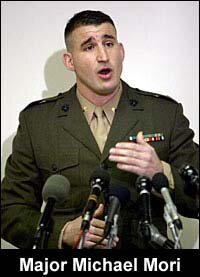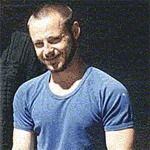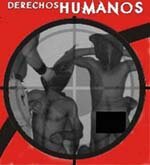 ELEANOR HALL: The military defence lawyer for Australian Guantanamo Bay detainee David Hicks is visiting Australia and today he thanked Melbourne University's Law School for its assistance in the Hicks case over the last three years. ELEANOR HALL: The military defence lawyer for Australian Guantanamo Bay detainee David Hicks is visiting Australia and today he thanked Melbourne University's Law School for its assistance in the Hicks case over the last three years.
Major Mori has been a guest of the Law School this week and last night he spoke to law students, academics and invited guests in a packed lecture theatre.
Alison Caldwell was there for The World Today.
ALISON CALDWELL: Major Michael Mori was in Melbourne last night to address law students at Melbourne University's Asia Pacific Centre for Military Law.
MICHAEL MORI: Well, when I was asked, I thought it was only going to be a group of about 20 people. So… (laughs)
ALISON CALDWELL: You were surprised at the turn out?
MICHAEL MORI: Yeah, I was very surprised at the turn out.
ALISON CALDWELL: So what does that say to you?
MICHAEL MORI: Well, obviously it's a law school where there's going to be a lot of interest in this area of the law - international humanitarian law and international law. Obviously commissions haven't happened in over 60 years and I think people are curious to see what's going on and learn the truth about the process and its problems.
ALISON CALDWELL: A lawyer with the US marines, Major Michael Mori volunteered to work as a defence lawyer for the proposed military commissions in Guantanamo Bay, in early 2003. He was assigned to defend the Australian detainee David Hicks.
With a background in US court marshalls, the Bush administration's new military commission process was something Major Mori had never experienced before.
He decided to seek advice from international law experts both in the US and here in Australia, and law lecturers and graduates at Melbourne University's Law School have been helping him ever since.
Law School graduate Sarah Finnin has been providing research assistance for Major Mori in Washington since 2004.
SARAH FINNIN: All five military lawyers and their paralegals, who were used to US court marshall proceedings, faced new challenges trying to understand the complex area of the international law of war and the unique procedural aspects of the newly established military commissions.
ALISON CALDWELL: Speaking to The World Today after his lecture, Major Mori said his faith in American military law hasn't wavered.
MICHAEL MORI: No, because remember, the Commission system wasn't set up by one of the Judge Advocate-Generals for one of their services. You know, it wasn't given to the Judge Advocate-General of the Army and said, you create this system, you do this independently.
It wasn't given to the Judge Advocate-General of the Navy and said, you set this up. This is not military justice. No one should be fooled to believe that it is. This is not the Court Marshall process.
The Court Marshall system is something to be very proud in.
ALISON CALDWELL: You've been coming to Australia for a couple of years now. Have you noticed a change in the Australian attitude towards David Hicks?
MICHAEL MORI: Well, I think it's taken some time for the initial media hype about David to… for people to start saying, well, wait a minute, let me see, what did he really do?
Stop listening just to the news media, you know, there was that blitz at the very beginning when he was detained and then people started questioning: okay, what did he exactly do? And they're finding out that he never really hurt anyone.
And time has gone by and I think four years is seen as sufficient consequences for what he's alleged to have done.
And I think they're also saying the unfair treatment when you look at him and how others are being treated, others are just being released, you've got the former Taliban ambassador attending university in the United States and yet David Hicks remains locked up, charged with aiding the Taliban.
It's shocking that a Taliban member, Taliban leader would have more rights than an Australian citizen.
ELEANOR HALL: US military lawyer, Major Michael Mori speaking to Alison Caldwell in Melbourne.
Click Here for more info on David Hicks and inmates at Guantanamo Bay
|


 FOUR years after terror-suspect David Hicks arrived in Cuba in a hood and shackles, described by the US as among the "worst of the worst", his military lawyer says he has lost all hope of being freed.
FOUR years after terror-suspect David Hicks arrived in Cuba in a hood and shackles, described by the US as among the "worst of the worst", his military lawyer says he has lost all hope of being freed.
 ELEANOR HALL: The military defence lawyer for Australian Guantanamo Bay detainee David Hicks is visiting Australia and today he thanked Melbourne University's Law School for its assistance in the Hicks case over the last three years.
ELEANOR HALL: The military defence lawyer for Australian Guantanamo Bay detainee David Hicks is visiting Australia and today he thanked Melbourne University's Law School for its assistance in the Hicks case over the last three years.




